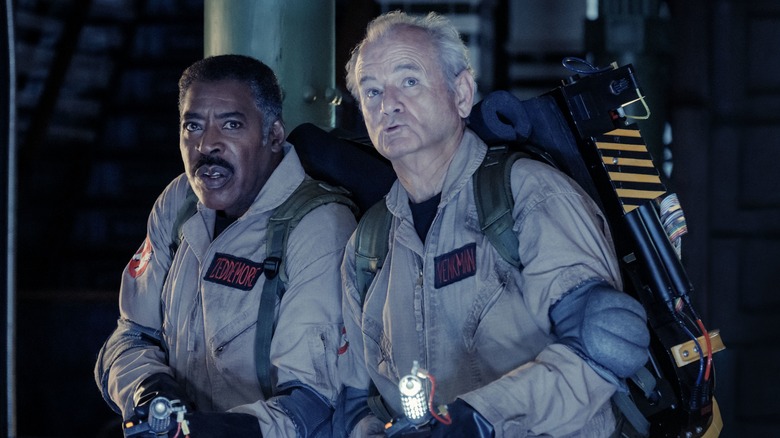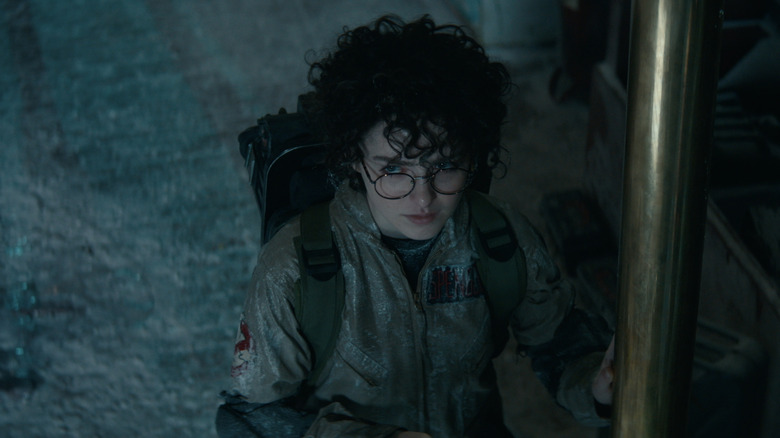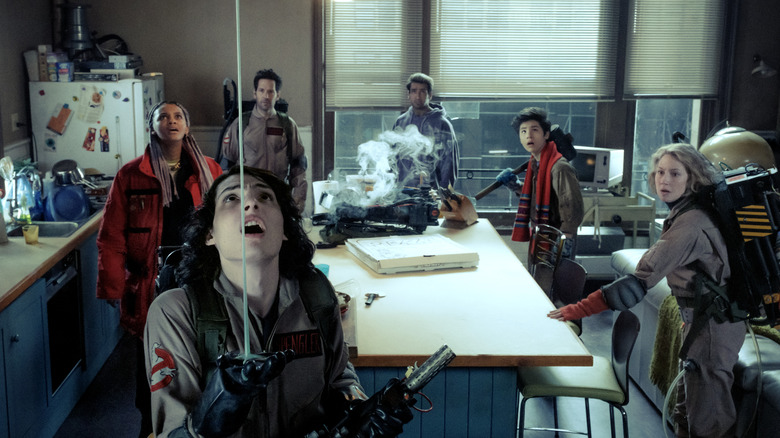Ghostbusters: Frozen Empire Review - Bustin' Made Me Feel... Meh
- There's a sweet family drama buried in the mix
- Forgets to be funny — this is a comedy sequel!
- Too many characters from different iterations and nobody is done justice
- Genuinely baffling attempt at LGBTQ+ inclusion in one subplot
For a franchise that's been the subject of a near-decade-long culture war because of a poorly received all-female reboot, it's certainly bold of "Ghostbusters: Frozen Empire" — the sequel to a movie largely created to appease aging male fans resistant to change — to include a queer coming-of-age subplot between a girl and a ghost. This is by far the most fascinating and frustrating aspect of an overstuffed sequel uncertain of whether it wants to fully lean into nostalgia for the 1984 original, or keep its focus strictly on the next generation of the Spengler family introduced in 2021's "Ghostbusters: Afterlife," likely satisfying neither new fans or old.
This scattershot focus does a disservice to a genuinely sweet family drama — where Paul Rudd's Gary Grooberson navigates his role as the new stepfather to teens Trevor (Finn Wolfhard) and Phoebe (McKenna Grace) — which should add depth to these characters, but remains stubbornly in the background. But at the same time, is making a broad, emotional character study what fans of any age really want from a supernatural comedy franchise?
Not queer enough!
The widespread criticism of the "Ghostbusters: Frozen Empire" trailer, that it looked like the filmmakers thought they were creating the next part of a sci-fi saga rather than a comedy one, bears out in the finished product. It's a movie that takes itself more seriously than any "Ghostbusters" movie should, with any laugh lines delivered exclusively by secondary characters introduced as comedy relief. It doesn't feel tinkered with by the studio to resemble a conventional blockbuster though: this is an identity crisis all of its own making.
Despite opening with a Robert Frost quote (get it?) and an icy prologue set in 1904, the "Frozen Empire" promised in the title doesn't materialize until the last half hour. Before then, we're reintroduced to the Spengler family, who've relocated from rural Oklahoma to the famous Ghostbusters Fire House in Manhattan and are already semi-established for capturing all manner of paranormal beasts around New York City. Threatened by eternal Ghostbuster-hater Walter Peck (William Atherton) to immediately cease what they're doing due to the unpaid labor of their 15-year-old daughter, they find that they're urgently needed thanks to the discovery of an ancient orb handed into Ray Stantz's (Dan Aykroyd, surprisingly a main character) pawn shop by slacker Nadeem (Kumail Nanjiani). This orb functions as a prison for an ice demon who hopes to resurrect a ghost army to take over the city once unleashed. This villain, Garraka, is a sincere attempt at making a terrifying foe, with none of the cutesy child-friendliness of Slimer or the Mini-Pufts — but, because the filmmakers are aware of the need to attract a young audience, the genuine threat of a monster that can turn anybody into ice and smash them into pieces within seconds remains under-utilized.
Now that we've discussed that, let's go back to the queer stuff. Bearing in mind the famous tweet that to be successfully queer-baited by the Marvel Cinematic Universe is like losing chess to a dog as I dive into this here, director Gil Kenan and co-writer Jason Reitman do all they can to make Phoebe's sudden close friendship with ghost teen Melody (Emily Alyn Lind) read as romantic without going as far to say such. There's an intensity to their interactions and their coded dialogue about them both feeling like outsiders, a broad euphemism in the same way "Mutants" became a catch-all allegory for LGBTQ+ identifying people in Bryan Singer's "X-Men" movies.
Without seeing the portrayal of this relationship, this will understandably read like a gay writer trying to find anything interesting to unpack in a review of a generally underwhelming sequel, especially considering there's no dialogue within their direct interactions to suggest anything other than friendship. But consider Phoebe's sudden desire to transform herself into a ghost after meeting the first person she claims to understand her, even going so far as to ask Ray Stantz if he's ever thought about becoming a ghost — yes, this allegory is written vaguely enough to scan as a trans one too — and it becomes clear that the writers want to tell a story about a young person grappling with their identity, but in a manner toothless enough to evade scrutiny from censors in China.
It all comes back to fan service
It's the most risky thing within a film otherwise coasting on former glories, and it doesn't even take the risks it needs that would do such a plot justice; realizing that they've written themselves into a corner, Gil Kenan and Jason Reitman instead have other characters write this episode in Phoebe's life off as "teenage rebellion," lingering on a final shot between girl and ghost long enough to make the audience think one will lean forward to kiss the other. It's deeply cynical storytelling, but I already know several fans online will lose chess to a dog by lapping this up.
Again, whether this coming-of-age story — as half-baked as it is — is what people want from the latest installment in a franchise that began with a ghost going down on Dan Aykroyd is another question altogether, but the most intriguing moments all originate from a more tender drama that feels lifted in from another genre entirely. Paul Rudd is surprisingly more effective when inhabiting the persona of a struggling stepfather rising to his new responsibilities than as a comedic lead, which is where the real dramatic tension of the movie stems from; the ghosts themselves function, more than ever, as a McGuffin to bring these characters together.
Other characters brought together are, of course, the original team — but aside from Aykroyd, here given a substantial role that is properly integrated within the narrative, it just feels like rehashing fan service that already felt tired in the last one. Thankfully, there's no Harold Ramis ghost this time around, but Bill Murray's performance could easily have been conjured up using the same CGI; his sudden appearance for the final battle, with zero narrative justification, is every bit as cynical as the coded queer storyline. What's more jarring is his sudden inability to play one of his most iconic roles, so plainly here for the money that every line delivery is flat as opposed to deadpan. That comedic gap he leaves isn't filled at the center — the story arc of the main family is too sincere for that — but several secondary characters aim to fill his shoes, with middling results. Kumail Nanjiani best captures the dry spirit of the original and lands a few laughs, even if his character remains a slacker archetype. British stand-up comedian James Acaster — falsely billed in the press materials as making his acting debut, as if Amazon Prime's "Cinderella" doesn't count — has clearly been asked to tone down the whimsy of his stage persona, but feels lost at sea. Robbed of his easily identifiable characteristics, it just feels like he was asked to take on a role Richard Ayoade turned down.
It's no surprise that "Ghostbusters: Frozen Empire" is a disappointment, but there are several signs that this franchise could have a new life if the filmmakers shook off any remaining ties to the original and did justice to the Spengler family. It's hard to care about them saving the day when this film aims to quickly brush off whatever growth they have.
"Ghostbusters: Frozen Empire" premieres in theatres on March 22.


